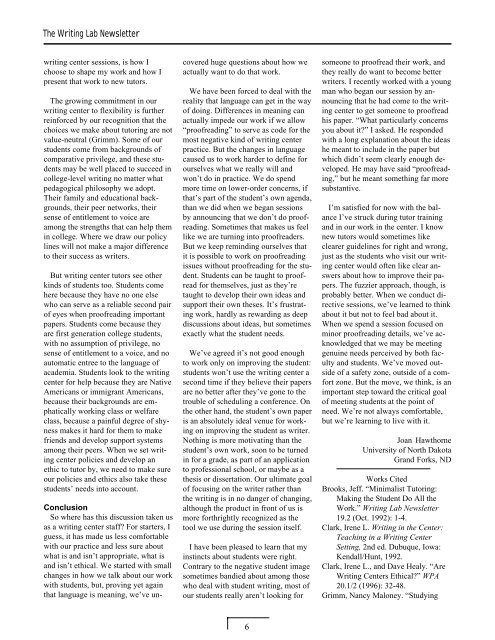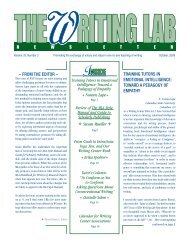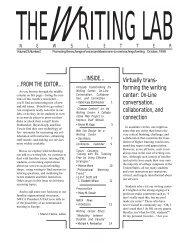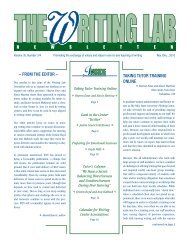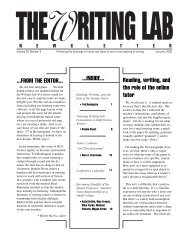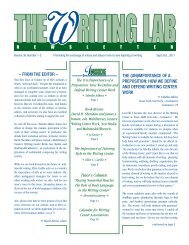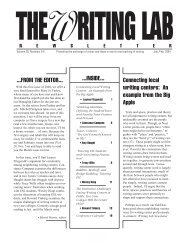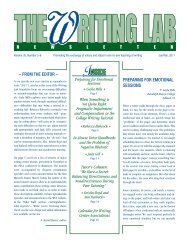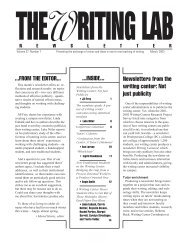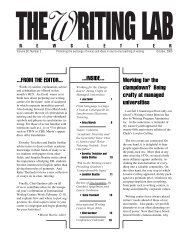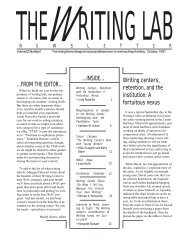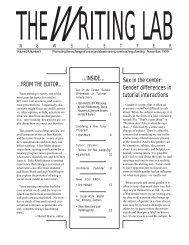We don't proofread here - The Writing Lab Newsletter
We don't proofread here - The Writing Lab Newsletter
We don't proofread here - The Writing Lab Newsletter
Create successful ePaper yourself
Turn your PDF publications into a flip-book with our unique Google optimized e-Paper software.
<strong>The</strong> <strong>Writing</strong> <strong>Lab</strong> <strong>Newsletter</strong><br />
writing center sessions, is how I<br />
choose to shape my work and how I<br />
present that work to new tutors.<br />
<strong>The</strong> growing commitment in our<br />
writing center to flexibility is further<br />
reinforced by our recognition that the<br />
choices we make about tutoring are not<br />
value-neutral (Grimm). Some of our<br />
students come from backgrounds of<br />
comparative privilege, and these students<br />
may be well placed to succeed in<br />
college-level writing no matter what<br />
pedagogical philosophy we adopt.<br />
<strong>The</strong>ir family and educational backgrounds,<br />
their peer networks, their<br />
sense of entitlement to voice are<br />
among the strengths that can help them<br />
in college. W<strong>here</strong> we draw our policy<br />
lines will not make a major difference<br />
to their success as writers.<br />
But writing center tutors see other<br />
kinds of students too. Students come<br />
<strong>here</strong> because they have no one else<br />
who can serve as a reliable second pair<br />
of eyes when <strong>proofread</strong>ing important<br />
papers. Students come because they<br />
are first generation college students,<br />
with no assumption of privilege, no<br />
sense of entitlement to a voice, and no<br />
automatic entree to the language of<br />
academia. Students look to the writing<br />
center for help because they are Native<br />
Americans or immigrant Americans,<br />
because their backgrounds are emphatically<br />
working class or welfare<br />
class, because a painful degree of shyness<br />
makes it hard for them to make<br />
friends and develop support systems<br />
among their peers. When we set writing<br />
center policies and develop an<br />
ethic to tutor by, we need to make sure<br />
our policies and ethics also take these<br />
students’ needs into account.<br />
Conclusion<br />
So w<strong>here</strong> has this discussion taken us<br />
as a writing center staff For starters, I<br />
guess, it has made us less comfortable<br />
with our practice and less sure about<br />
what is and isn’t appropriate, what is<br />
and isn’t ethical. <strong>We</strong> started with small<br />
changes in how we talk about our work<br />
with students, but, proving yet again<br />
that language is meaning, we’ve uncovered<br />
huge questions about how we<br />
actually want to do that work.<br />
<strong>We</strong> have been forced to deal with the<br />
reality that language can get in the way<br />
of doing. Differences in meaning can<br />
actually impede our work if we allow<br />
“<strong>proofread</strong>ing” to serve as code for the<br />
most negative kind of writing center<br />
practice. But the changes in language<br />
caused us to work harder to define for<br />
ourselves what we really will and<br />
won’t do in practice. <strong>We</strong> do spend<br />
more time on lower-order concerns, if<br />
that’s part of the student’s own agenda,<br />
than we did when we began sessions<br />
by announcing that we don’t do <strong>proofread</strong>ing.<br />
Sometimes that makes us feel<br />
like we are turning into <strong>proofread</strong>ers.<br />
But we keep reminding ourselves that<br />
it is possible to work on <strong>proofread</strong>ing<br />
issues without <strong>proofread</strong>ing for the student.<br />
Students can be taught to <strong>proofread</strong><br />
for themselves, just as they’re<br />
taught to develop their own ideas and<br />
support their own theses. It’s frustrating<br />
work, hardly as rewarding as deep<br />
discussions about ideas, but sometimes<br />
exactly what the student needs.<br />
<strong>We</strong>’ve agreed it’s not good enough<br />
to work only on improving the student:<br />
students won’t use the writing center a<br />
second time if they believe their papers<br />
are no better after they’ve gone to the<br />
trouble of scheduling a conference. On<br />
the other hand, the student’s own paper<br />
is an absolutely ideal venue for working<br />
on improving the student as writer.<br />
Nothing is more motivating than the<br />
student’s own work, soon to be turned<br />
in for a grade, as part of an application<br />
to professional school, or maybe as a<br />
thesis or dissertation. Our ultimate goal<br />
of focusing on the writer rather than<br />
the writing is in no danger of changing,<br />
although the product in front of us is<br />
more forthrightly recognized as the<br />
tool we use during the session itself.<br />
I have been pleased to learn that my<br />
instincts about students were right.<br />
Contrary to the negative student image<br />
sometimes bandied about among those<br />
who deal with student writing, most of<br />
our students really aren’t looking for<br />
someone to <strong>proofread</strong> their work, and<br />
they really do want to become better<br />
writers. I recently worked with a young<br />
man who began our session by announcing<br />
that he had come to the writing<br />
center to get someone to <strong>proofread</strong><br />
his paper. “What particularly concerns<br />
you about it” I asked. He responded<br />
with a long explanation about the ideas<br />
he meant to include in the paper but<br />
which didn’t seem clearly enough developed.<br />
He may have said “<strong>proofread</strong>ing,”<br />
but he meant something far more<br />
substantive.<br />
I’m satisfied for now with the balance<br />
I’ve struck during tutor training<br />
and in our work in the center. I know<br />
new tutors would sometimes like<br />
clearer guidelines for right and wrong,<br />
just as the students who visit our writing<br />
center would often like clear answers<br />
about how to improve their papers.<br />
<strong>The</strong> fuzzier approach, though, is<br />
probably better. When we conduct directive<br />
sessions, we’ve learned to think<br />
about it but not to feel bad about it.<br />
When we spend a session focused on<br />
minor <strong>proofread</strong>ing details, we’ve acknowledged<br />
that we may be meeting<br />
genuine needs perceived by both faculty<br />
and students. <strong>We</strong>’ve moved outside<br />
of a safety zone, outside of a comfort<br />
zone. But the move, we think, is an<br />
important step toward the critical goal<br />
of meeting students at the point of<br />
need. <strong>We</strong>’re not always comfortable,<br />
but we’re learning to live with it.<br />
Joan Hawthorne<br />
University of North Dakota<br />
Grand Forks, ND<br />
Works Cited<br />
Brooks, Jeff. “Minimalist Tutoring:<br />
Making the Student Do All the<br />
Work.” <strong>Writing</strong> <strong>Lab</strong> <strong>Newsletter</strong><br />
19.2 (Oct. 1992): 1-4.<br />
Clark, Irene L. <strong>Writing</strong> in the Center:<br />
Teaching in a <strong>Writing</strong> Center<br />
Setting, 2nd ed. Dubuque, Iowa:<br />
Kendall/Hunt, 1992.<br />
Clark, Irene L., and Dave Healy. “Are<br />
<strong>Writing</strong> Centers Ethical” WPA<br />
20.1/2 (1996): 32-48.<br />
Grimm, Nancy Maloney. “Studying<br />
6


